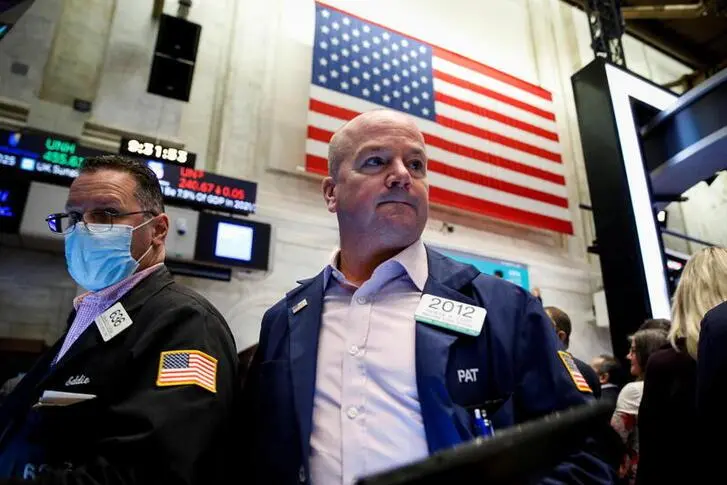PHOTO
BENGALURU- Global fund management firms recommended holding equity allocations steady at a near four-year high in a model portfolio this month, according to a Reuters survey taken mostly before the latest COVID-19 related turbulence in stock markets.
The Nov. 15-30 poll of 35 fund managers and chief investment officers in Europe, the United States and Japan showed no change in suggested equity exposure at an average 50.3%, the highest since late 2017, with bonds also steady at 39.0%.
Late last week, traders and investors dumped stocks following the detection of a new and possibly vaccine-resistant coronavirus variant, Omicron, marking the worst week for global shares since early October.
But stock markets have since rebounded.
"These COVID-19 risks had been priced out, but will still be a major risk to markets...it must be stressed it is far too early to tell if the Omicron variant will lead to vaccine escape," Craig Hoyda, senior quantitative analyst at abrdn, said.
"While there is a strong argument to take risk off the table - a modest cut to equity positions - it would be inadvisable to react in the extreme by completely rotating portfolios."
The U.S. benchmark S&P 500 and the Dow Jones indices are up 24% and 15% respectively on the year, with their British and European counterparts, the FTSE and Stoxx 600 up about 9% and 16%.
The Omicron variant surfaced when investors are focused on how soon major central banks like the Federal Reserve - which started tapering its support for the economy this month - will start hiking interest rates to curb inflation.
"There is a sense of complacency in the market and in central bank action which scares us the most. Central banks continue to reiterate the transitory narrative, in a sort of benign neglect of inflation risk," said, Matteo Germano, global head of multi-asset at Amundi.
"Inflation is now everywhere: it was a U.S.-only story and now it is spreading around in developed and emerging markets, with the main exception of China."
Asked on the more likely outlook for corporate earnings in their local markets, respondents were almost evenly split. Eleven of 21 respondents said they would improve, while the rest said they would worsen.
"We remain positive on the corporate earnings outlook for 2022, however, the recent rise in inflation, supply chain bottlenecks and pullback in global GDP is a short-term concern," said Peter Lowman, chief investment officer at Investment Quorum.
"Consumer spending will undoubtedly help numbers in the fourth quarter and the global economy should pick-up through 2022 along with some corporate earnings surprises."
(Reporting and Polling by Tushar Goenka in BENGALURU and Fumika Inoue in TOKYO; Editing by Emelia Sithole-Matarise) ((Tushar.Goenka@thomsonreuters.com; +91 8123486297))





















